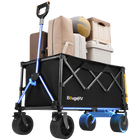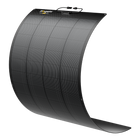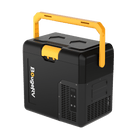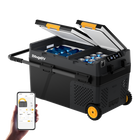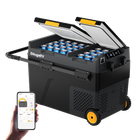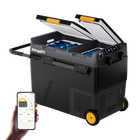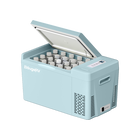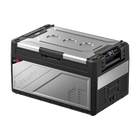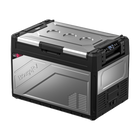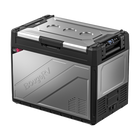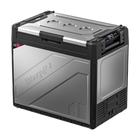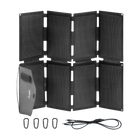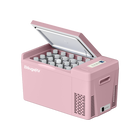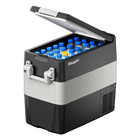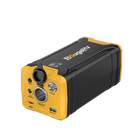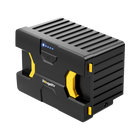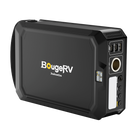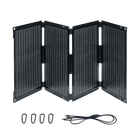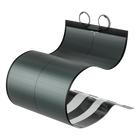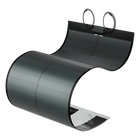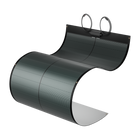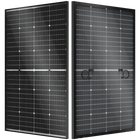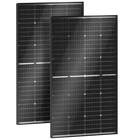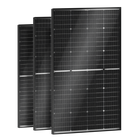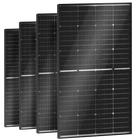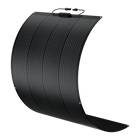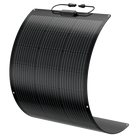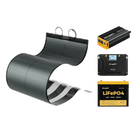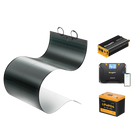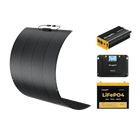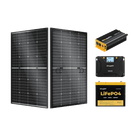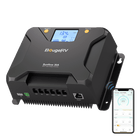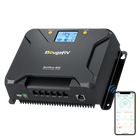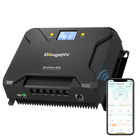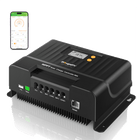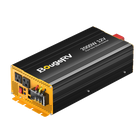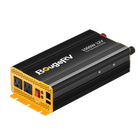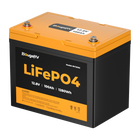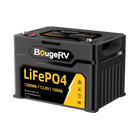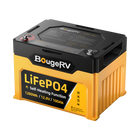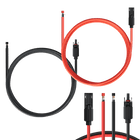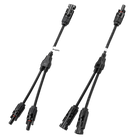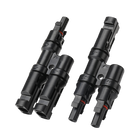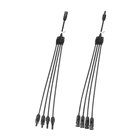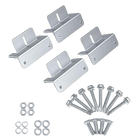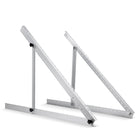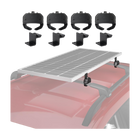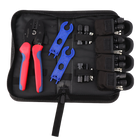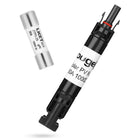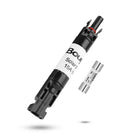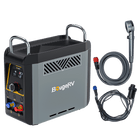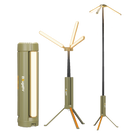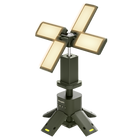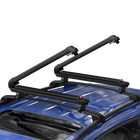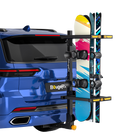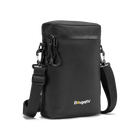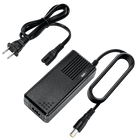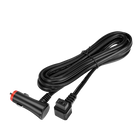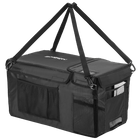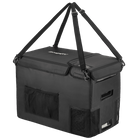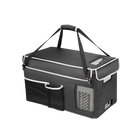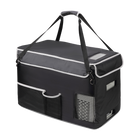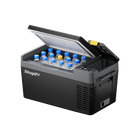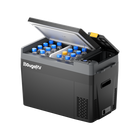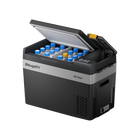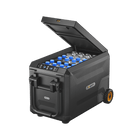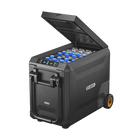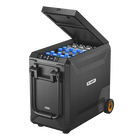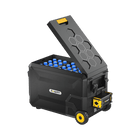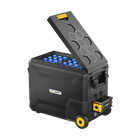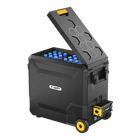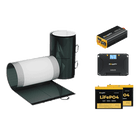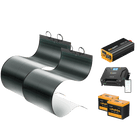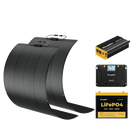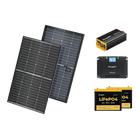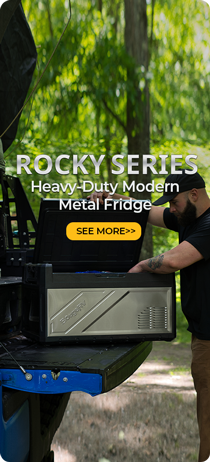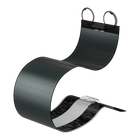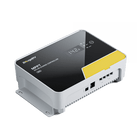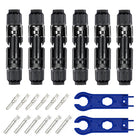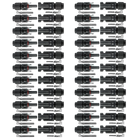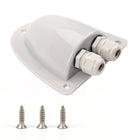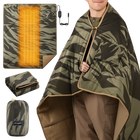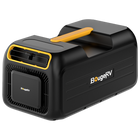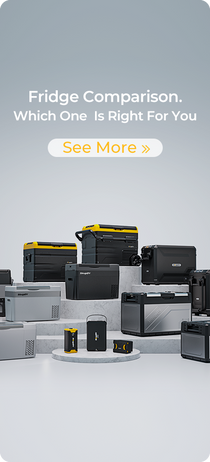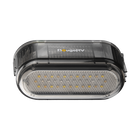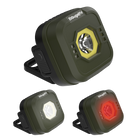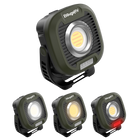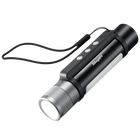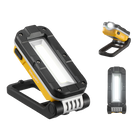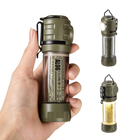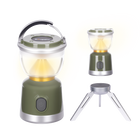Are Portable Solar Panels Worth It?


Whether you're looking for a way to power your devices on the go or want to reduce your carbon footprint and save money on your electricity bill, investing in portable solar panels is worthwhile.
In this blog, we'll delve into what portable solar panels are, how they work, their types, their pros and cons, and some of the best portable solar panels on the market. We'll also answer frequently asked questions about portable solar panels to help you find the best one for your needs.
Read on and get inspired now!
Portable Solar Panel Overview

Portable solar panels can convert sunlight into electricity, which can power your devices, small and large appliances, or even your entire home. They can be easily transported for use while camping, hiking, or RVing. Designed smaller in size, some portable solar panels come with unique features such as a kickstand, USB ports, or a foldable design for convenient use and storage.
While larger portable solar panels can produce as much power as standard rooftop panels, they are not meant to replace them because portable solar panels lack the structural integrity and voltage regulation of properly mounted rooftop solar setups.
Types of Portable Solar Panels
Portable solar panels come in different sizes, shapes, and power outputs. These are the main types of portable solar panels:
-
Flexible panels (foldable or "suitcase" style). Flexible solar panels can generate 20 to 100 watts of power and are more suitable for larger devices such as laptops, tablets, cameras, or small appliances like coffee makers. These flexible panels are lightweight and easy to transport. However, they are also more expensive than rigid panels.
-
Rigid solar panels with a kickstand. Rigid solar panels typically generate 100W or more and can power larger appliances such as TVs, refrigerators, and air conditioners. They are more stable and efficient than flexible panels, but they are also heavier and bulkier.
-
Solar phone chargers. Solar phone chargers are small, foldable panels that produce 5 to 20 watts. They're ideal for backpackers and campers who need to keep their phones or other small devices charged. These often feature a USB port or a built-in battery pack to which you can connect your device.
Based on the solar cells used in the panels, there are primarily two types: Monocrystalline and thin film solar panels.
-
Monocrystalline solar panels are made of single-crystal silicon cells that have high efficiency and durability. They produce electricity very efficiently in sunny conditions, but they are generally heavier than thin-film solar panels.
-
Thin-film solar panels are composed of thin layers of different materials, such as amorphous silicon, cadmium telluride, or copper indium gallium selenide. Although they tend to be more expensive and slightly less efficient than Monocrystalline panels, they are much lighter, more flexible, and more resistant to bumps and drops. Thin-film solar panels also perform better in low-light conditions or on cloudy days.
Some flexible solar panels made out of CIGS thin-film solar cells can even adapt to curved or uneven surfaces.
Advantages and Disadvantages of Portable Solar Panels

Portable solar panels have many benefits, but they also have some drawbacks that you should be aware of before buying them.
Pros:
-
Versatile for various uses. You can use portable solar panels for camping, hiking, boating, RVing, apartment living, battery backup source or even living off the grid. You can also move them around and adjust them to different locations and situations.
-
Overcharge protection. Most portable solar panels come with a charge controller that regulates the voltage and prevents overcharging or damaging your battery. Some also have built-in safety design, such as short circuit protection, reverse polarity protection, or temperature protection.
-
Long life span. Generally using high-quality Monocrystalline or thin film solar cells that have high efficiency and durability, portable solar panels can last 20-30 years if you take good care of them.
-
Easy to mount. Some portable solar panels, such as foldable solar panels, require no installation and need no permits or inspections.
-
Low cost of maintenance. Portable solar panels require very little maintenance. All you need to do is keep them clean from dust and dirt and check them for any damage or wear and tear.
-
Lower your electricity bills: If you use portable solar panels for your home, you can save money on your electricity bill by generating your own electricity. You can also sell any excess power back to the grid if your solar system is connected to it.
-
Provides renewable energy. It’s a great way to reduce your carbon footprint by using clean and sustainable energy. Portable solar panels don’t emit any harmful gases or pollutants and do not rely on fossil fuels or grid power.
Cons:
-
High initial cost. Portable solar panels can be expensive, especially if you need a large or powerful system. You also need to factor in the cost of other components such as batteries, inverters, cables, and power stations.
-
Limited power output. Portable solar panels can only produce a limited amount of power. They may not be sufficient to power all your large devices or appliances simultaneously or for long periods of time. Therefore, the most effective way to utilize solar panels is by pairing them with power stations or batteries.
-
Dependence on the weather. Some rigid portable solar panels rely on the weather and the sun for their power output. If there isn't enough sunlight, you may not get sufficient power from your panels. You might also need to adjust your panel's angle and orientation throughout the day to maximize its exposure to the sun.
-
Space requirements. Some portable solar panels made from Monocrystalline cells may not work if your RV or recreational vehicle has limited space. You might also need to secure them with stakes or straps to prevent them from falling or blowing away. Alternatively, you could choose flexible solar panels with a foldable design.
Best Portable Solar Panels for Camping at BougeRV
The portable solar panels for camping should be compact and light enough to easily carry, yet powerful enough to charge your gear and devices. Look for those that can endure outdoor conditions like rain, dust, wind, and snow. Here are some of the best portable solar panels for camping:
1. BougeRV Yuma 200W CIGS Thin-film Flexible Solar Panel with Tape

The BougeRV 200W Yuma CIGS flexible solar panel is the best portable camping solar panel overall thanks to its 360° flexibility and excellent performance even in low-light situations. You can attach it to any surface because of their durable, any-weather adhesive. It’s highly compact and portable, so you can easily take it with you even when you’re packing light.
With 200 watts of power, you can charge all of your favorite electronics and even offer power to basic appliances like projectors, coffee makers, and camp stoves.
We also offer high-wattage flexible solar panels. So if you're interested in spending less for more power, you can certainly do that.
Our CIGS flexible solar products last for 25 years, so it’s worth the investment if you plan on camping a lot.
2. Bifacial 100W 12V 9BB Mono Solar Panel

Our bifacial 200W solar panels can capture the maximum amount of sun throughout different hours of the day and can generate 30% more solar energy. They can absorb sunlight from both sides of the solar panel, instead of only one side.
These bifacial solar panels are ideal for mounting on your RV roofs, camper vans, and even camping cars. However, remember that these solar panels have a substantial weight of 24 pounds, so they're better suited for stationary installations.
3. Paso 100W CIGS Portable Solar Blanket

We truly understand that every inch of space and pound of weight matters when you're backpacking or hiking. That's what makes our PASO 100W CIGS portable solar blanket perfect. It weighs less than 5 lbs and folds down into a small blanket, so it can easily fit into your pack.
This CIGS flexible solar blanket panel is also resistant to damage from bumps and cracks. This means you can pack it into your bag and take it with you on your backpacking trip, no matter the conditions, without fear of breaking it in the process.
4. 200W 12V 9BB Portable Solar Panel

The BougeRV 200W 12V Portable Solar Panel is useful for camping because it's lightweight and easy to pack. This portable solar panel can be folded down to just 21.9 inches. It also has adjustable stands, so you can always catch the sunlight.
Also, it requires no drilling or installation process. Simply open up the solar panel and point it toward the sun to easily harness solar energy for your camping trip.
BougeRV’s Portable Solar Panels for Home Use
You can indeed power your house with portable solar panels for minor energy needs or a backup power source, though they’re more suitable for small-scale or temporary uses.
To power your home with portable solar panels, you will need solar panels that have high power output and capacity that can meet your energy needs. You will also need a battery bank to store the excess electricity that you generate during the day and use it at night or when the sun goes down. Additionally, you will need an inverter to convert the direct current (DC) from the panels and batteries into alternating current (AC) that your appliances use.
1. Bifacial 200W 12V 9BB Mono Solar Panel

This portable 200W bifacial solar panel can capture sunlight from both sides, creating 30% more energy. The substantial power it produces can meet your high energy needs, reducing your payback period.
Despite its excellent output, this item is relatively compact and easy to transport, making it an ideal choice for your tiny home like a shed where space is limited. Moreover, our bifacial solar panels are affordable enough to have even if you have a strict budget.
2. 400W 12V 10BB Mono Solar Panel

With a power output of 400W, this 400W 12V solar panel can generate a great amount of electricity to help reduce your home's dependence on grid power and decrease your energy bills.
This high-wattage solar panel, combined with toughened glass and sturdy frames, is durable enough for permanent residential installation. With pre-drilled holes and cables, it can be installed easily and quickly.
If you're in the market for efficient high-wattage solar panels, the BougeRV 400W bifacial solar panel is a worthwhile investment.
3. 300W 12V 10BB Mono Solar Panel

The 300W 12V 10BB Mono Solar Panel shares the same features as our 400W 10BB Mono Solar panel. It’s highly efficient and space-saving. If you're seeking a solar panel with a capacity a bit lower than standard rooftop solar panels to complete your existing solar system, this 300W 12V 10BB Portable Mono Solar Panel is just right for you!
Final Thoughts

Portable solar panels are a worthwhile investment that offers you an eco-friendly, cost-effective, and versatile power source. Despite some limitations, their benefits such as offering portability, reducing electricity bills, and providing renewable energy make them an excellent choice for outdoor activities, emergencies, and even home use.
With various types available on the market, BougeRV’s portable solar panel for outdoor camping and home use, you're sure to find one that suits your needs perfectly. Choose portable solar panels today, and take a step towards a more sustainable and energy-independent lifestyle!
FAQs
1. Are Portable Solar Panels Effective?
Yes, portable solar panels are effective. They are more compact and can run a home 100% using solar energy. But, they can not provide as much energy as full-size solar panels.
2. What Can Portable Solar Panels Charge?
Portable solar panels can power smaller electronics like phones or laptops, tablets, cameras, portable lights, GPS devices, and camping gear. They can also charge some small appliances like a microwave and even vehicles like RVs or boats. They can also be used to charge power banks or portable batteries.
3. What Do You Need for Portable Solar Power?
When purchasing a bigger portable solar panel, you need to make sure that you have the necessary cables, an inverter, and a battery bank if you plan to store energy for use beyond daylight hours. Also, it's crucial to check if you can connect your devices to the panels through USB ports or other types of outlets.
4. How Many Watts Is a Good Portable Solar Panel?
Higher wattage indicates more energy production, which translates to a shorter charging time for your devices. Generally, the power output of portable solar panels ranges from 200W to 400W.
5. Is It Worth Getting a Portable Solar Panel?
Portable solar panels are eco-friendly and provide a reliable portable power source for outdoor activities or emergencies. They can charge electronic devices, reducing electricity costs. However, it's still worth noting that efficiency depends on the weather, and portable solar panels may not be as powerful as regular electricity sources.


